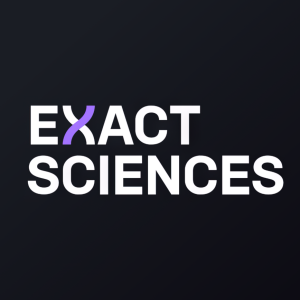Exact Sciences Unveils Data Showing Promise of Multi-Cancer Early Detection at AACR Special Conference on Liquid Biopsy
New evidence shows multi-biomarker class approach improved cancer detection, including in earlier stages when treatment may be more effective
Modeling data estimate adding MCED testing to standard-of-care screening could reduce cancer mortality by
New analysis from DETECT-A study supports MCED testing as a complement to current guideline-recommended screening
“Cancer is on pace to be the leading cause of death in the
A new study demonstrates the ability of a multi-biomarker class MCED test to improve early-stage sensitivity by incorporating a DNA mutation reflex approach to methylation and protein (MP) test results. When excluding breast and prostate cancer and at a
Cancer stage |
MP-r sensitivity |
MP sensitivity |
% improvement |
Stage I |
|
|
|
Stage II |
|
|
|
Stage I/II |
|
|
|
Overall |
|
|
|
This new research will help inform the final design of Exact Sciences’ Cancerguard™ test, which is currently in development and intends to harness the additive sensitivity of multiple biomarker classes to detect more cancers in earlier stages.
The abstracts featured at the AACR Special Conference: Liquid Biopsy 2024 are as follows:
Title: Performance of multi-biomarker class reflex testing in a prospectively-collected cohort
Poster session: Thursday, November 14, 5:15 – 7:15 p.m. PT (Session A)
Poster number: A056
Key findings: A new analysis from a case-control study demonstrated the ability of a three-biomarker class (DNA methylation, protein, DNA mutation reflex, or MP-r) MCED test approach to increase sensitivity for early-stage detection. When excluding breast and prostate cancer, stage I sensitivity increased by
Title: The potential of multi-cancer early detection screening for reducing cancer mortality
Oral presentation: Friday, November 15, 9:35 a.m. PT (Plenary Session 4: Early Detection of Primary Cancer and Relapse)
Presenter: Tyson, C
Poster number: PR006, A073
Key findings: New modeling points to the potential to reduce the burden of cancer by demonstrating an estimated
Title: Lung cancer screening adherence among participants in DETECT-A, the first prospective interventional trial of a multi-cancer early detection (MCED) blood test
Poster session: Thursday, November 14, 5:15 – 7:15 p.m. PT (Session A)
Poster number: A064
Key findings: Analysis from the prospective, interventional DETECT-A study showed lung cancer screening adherence was not reduced in participants who received an MCED test compared to controls.
About the DETECT-A study
The DETECT-A (Detecting cancers Early Through Elective mutation-based blood Collection and Testing) study was the first-ever large, prospective, interventional study to use a blood test to detect multiple types of cancer in a real-world setting. The DETECT-A study enrolled more than 10,000 women with no history of cancer to determine if a blood test in combination with standard-of-care screenings could detect cancers before signs and symptoms appeared. The CancerSEEK test, the MCED test studied in DETECT-A, was the forerunner to the Cancerguard test, the MCED test currently in development at Exact Sciences.
About the Cancerguard™ test
The Cancerguard test, currently in development, is designed to detect multiple cancers in their earliest stages from a single blood draw. Building upon decades of research, Exact Sciences intends to harness the additive sensitivity of multiple biomarker classes to detect more cancers in earlier stages. The Cancerguard test will utilize a streamlined and standardized imaging-based diagnostic pathway, which may result in fewer follow-up procedures. The test is being developed to provide high specificity to help minimize false positives while detecting multiple cancers, including those with the biggest toll on human health. These features describe current development goals. The Cancerguard test has not been cleared or approved by the
About Exact Sciences Corp.
A leading provider of cancer screening and diagnostic tests, Exact Sciences gives patients and health care professionals the clarity needed to take life-changing action earlier. Building on the success of the Cologuard® and Oncotype® tests, Exact Sciences is investing in its pipeline to develop innovative solutions for use before, during, and after a cancer diagnosis. For more information, visit ExactSciences.com, follow Exact Sciences on X (formerly known as Twitter) @ExactSciences, or find Exact Sciences on LinkedIn and Facebook.
Forward-Looking Statement
This news release contains forward-looking statements concerning our expectations, anticipations, intentions, beliefs, or strategies regarding the future. These forward-looking statements are based on assumptions that we have made as of the date hereof and are subject to known and unknown risks and uncertainties that could cause actual results, conditions, and events to differ materially from those anticipated. Therefore, you should not place undue reliance on forward-looking statements. Examples of forward-looking statements include, among others, statements we make regarding the development and commercialization of the Cancerguard test, and the performance characteristics and healthcare benefits of the Cancerguard test. Risks and uncertainties that may affect our forward-looking statements are described in the Risk Factors sections of our most recent Annual Report on Form 10-K and any subsequent Quarterly Reports on Form 10-Q, and in our other reports filed with the Securities and Exchange Commission. We undertake no obligation to publicly update any forward-looking statement, whether written or oral, that may be made from time to time, whether as a result of new information, future developments or otherwise.
References:
- CDC Archive. Future Health of our Nation Infographic. Accessed July 12, 2024.
-
NORC at the University of
Chicago . New Research Highlights Just One In Seven Diagnosed Cancers Found By A Recommended Screening Test. Accessed October 31, 2024. Limitations: Based on modeling data derived from numerous sources including self-reported surveys. Includes assumptions on detectability of certain cancer types. Does not include all cancer types or screening methods.
View source version on businesswire.com: https://www.businesswire.com/news/home/20241113756824/en/
Exact Sciences
Media Contact: Allison Barry, abarry@exactsciences.com, 980.297.1957
Investor Contact: Erik Holznecht, investorrelations@exactsciences.com, 608.800.6605
Source: Exact Sciences Corp.







